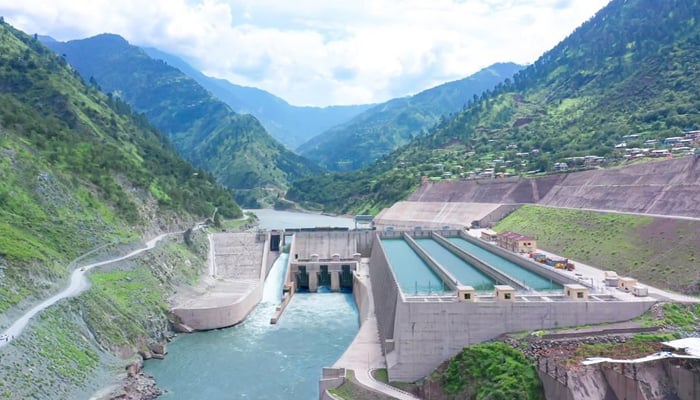KP expects to generate Rs50bn from 12 ongoing power projects
He explained comprehensive strategy has been formulated to increase annual income of Mineral Department from Rs4 to 6bn
PESHAWAR: Dr. Syed Sarfaraz Ali Shah, the caretaker advisor for planning and development in the Energy and Power Department in Khyber Pakhtunkhwa, has said that KP will annually earn Rs50 billion from hydropower as soon as the 12 ongoing projects are completed. The province possesses significant potential in mineral and water resources, serving as a major source of income.
He visited the Daily Jang and The News offices and, during a chat with this correspondent, mentioned that the caretaker government is committed to setting a milestone for development and prosperity for the masses of the province while also establishing an ideal setup for the incoming governments. Timely completion of ongoing development projects and the establishment of institutional good governance are top priorities.
He explained that a comprehensive strategy has been formulated to increase the annual income of the Mineral Department from Rs 4 to 6 billion, including a boost in annual income from hydropower projects to Rs 50 billion. This move is anticipated to be a game-changer for the economic development of the province, creating new employment opportunities in the coming years.
Responding to a question, he emphasised that the primary duty of the present caretaker provincial government is to conduct free and transparent elections in the province, utilising all available resources for this purpose.
Dr. Sarfaraz Shah, with a background in the economic sector, expressed his efforts to maximise the utilisation of the province’s natural resources to create an economic revolution. He has worked towards quickly identifying valuable mineral reserves through surveys across the province, particularly in the merged tribal districts.
Dr. Sarfaraz Shah highlighted the reforms in the prevailing leasing policy while promoting investment in mineral development. He emphasised the significance of the energy sector, noting that the Pakhtunkhwa Energy Development Organisation (PEDO), a subsidiary of the Energy & Power Department KP, is a profitable provincial organization. PEDO has completed 7 hydropower projects, generating a total of 161 megawatts of electricity and contributing more than Rs. 4 billion annually to the province.
He shared details of the 12 ongoing projects, including Balakot Mansehra (300 MW), Madyen Swat (157 MW), Gabral Kalam (88 MW), Matiltan Swat (84 MW), Lawi Chitral (69 MW), Koto Dir (40.8 MW), Krora Shangla (11.8 MW), Chapri Charkhel Kuram (10.5 MW), and Mujahideen Torghar (6.9 MW). Additionally, PEDO has prepared a business and financial plan for the next 10 years, anticipating the completion of several projects with a total capacity of 2000 megawatts, contributing Rs. 50 billion annually to the province.
Dr. Sarfaraz Shah also mentioned that several energy projects are nearing completion and plans are underway to sell cheap electricity to the industrial sector at favourable rates under the wheeling model. The establishment of Khyber Pakhtunkhwa Transmission and Grid Company (KPT&GC) is highlighted as a significant step to improve the electricity system in the province and facilitate the transmission of generated electricity.
In response to a question about financial challenges, the provincial caretaker adviser acknowledged that the province is facing severe financial challenges.
The provincial government has approached the federal government to release the pending amount of billions of rupees for hydropower, but the dues have not been cleared yet. In the oil and gas sector, steps are being taken to discover new blocks and increase the royalty for the province, he concluded.
-
 Kim Kardashian And Lewis Hamilton Make First Public Appearance As A Couple At Super Bowl 2026
Kim Kardashian And Lewis Hamilton Make First Public Appearance As A Couple At Super Bowl 2026 -
 Romeo And Cruz Beckham Subtly Roast Brooklyn With New Family Tattoos
Romeo And Cruz Beckham Subtly Roast Brooklyn With New Family Tattoos -
 Meghan Markle Called Out For Unturthful Comment About Queen Curtsy
Meghan Markle Called Out For Unturthful Comment About Queen Curtsy -
 Bad Bunny Headlines Super Bowl With Hits, Dancers And Celebrity Guests
Bad Bunny Headlines Super Bowl With Hits, Dancers And Celebrity Guests -
 Insiders Weigh In On Kim Kardashian And Lewis Hamilton's Relationship
Insiders Weigh In On Kim Kardashian And Lewis Hamilton's Relationship -
 Prince William, Kate Middleton Private Time At Posh French Location Laid Bare
Prince William, Kate Middleton Private Time At Posh French Location Laid Bare -
 Stefon Diggs Family Explained: How Many Children The Patriots Star Has And With Whom
Stefon Diggs Family Explained: How Many Children The Patriots Star Has And With Whom -
 ‘Narcissist’ Andrew Still Feels ‘invincible’ After Exile
‘Narcissist’ Andrew Still Feels ‘invincible’ After Exile -
 Shamed Andrew ‘mental State’ Under Scrutiny Amid Difficult Time
Shamed Andrew ‘mental State’ Under Scrutiny Amid Difficult Time -
 Bad Bunny's Super Bowl Halftime Show: What Time Will He Perform Tonight?
Bad Bunny's Super Bowl Halftime Show: What Time Will He Perform Tonight? -
 Where Is Super Bowl 2026 Taking Place? Everything To Know About The NFL Showdown
Where Is Super Bowl 2026 Taking Place? Everything To Know About The NFL Showdown -
 Chris Pratt Explains Why He And Katherine Schwarzenegger Did Premarital Counseling
Chris Pratt Explains Why He And Katherine Schwarzenegger Did Premarital Counseling -
 Drake 'turns Down' Chance To Hit Back At Kendrick Lamar At Super Bowl
Drake 'turns Down' Chance To Hit Back At Kendrick Lamar At Super Bowl -
 Sarah Ferguson Had A ‘psychosexual Network’ With Jeffrey Epstein
Sarah Ferguson Had A ‘psychosexual Network’ With Jeffrey Epstein -
 Miranda Kerr Shares The One Wellness Practice She Does With Her Kids
Miranda Kerr Shares The One Wellness Practice She Does With Her Kids -
 Czech Republic Supports Social Media Ban For Under-15
Czech Republic Supports Social Media Ban For Under-15




